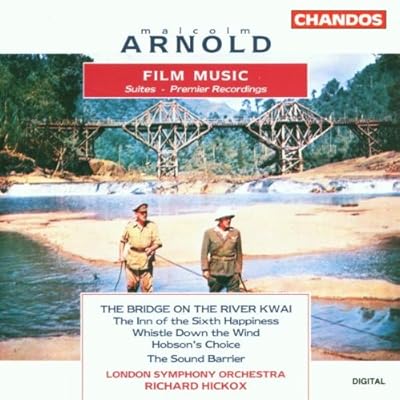tri2061990
10-03-2011, 10:10 AM

Sir Malcolm Arnold started composing for films in 1947 and stopped over 23 years later with more than 100 scores for features and documentaries to his credit, not to mention incidental music. During this period he also produced most of his non-film music, music for all genres and age groups. Arnold writes at high speed with very few preliminary sketches, having worked everything out in his mind beforehand; he rarely makes changes and prefers composing new works to recycling old ones.
Arnold claims he went into film music because he loved films and because it enabled him to practice not only composing (and earn a good living from it) but also conducting. He describes film work as, �an immensely liberating experience, an invaluable asset to professionalism� and says that he always writes the kind of music he wants to hear as the member of an audience. His success in the medium is easy to understand: he works quickly and well; his music always has a strong dramatic undercurrent; he has a vivid sense of orchestral colour and effect; his melodic invention is second to no-one�s in post-war Britain; and his music in the cinema makes the kind of immediate impact that film music must make. A film composer, in fact, not only has to be right first time round, he also has to communicate first time round.
Arnold is not afraid to be obvious, nor does he avoid clich�s and mannerisms if they work. He acknowledges debts to William Alwyn and Sir William Walton, but above all to Berlioz, one of his greatest musical enthusiasms � �If a film-score comes out uninfluenced by Berlioz, it�s no damn good!�
Reviews
�Richard Hickox conducts the LSO with splendid panache, and the playing is heartfelt. The Chandos engineers have responded with recording of spectacular range and colour� There are not many discs of a composer�s film-music as varied or as richly enjoyabl
Gramophone
'This splendid CD is as much a tribute to the skills of the late Christopher Palmer who created the suites for this recording as it is to the performers and engineers and the ever-imaginative Arnold.'
Gramophone
�All this music is superbly played by Hickox and the LSO� and the recording is as lavish as anyone could wish � very much in the Chandos demonstration bracket.�
The Penguin Complete Guide
�Richard Hickox and the London Symphony Orchestra obviously relish these colourful and contrasting suites� Highly recommended.�
Classic CD
Tracks
01. Bridge on the River Kwai: 1. Prelude: The Prison Camp [0:06:27.85]
02. Bridge on the River Kwai: 2. Colonel Bogey [0:04:09.24]
03. Bridge on the River Kwai: 3. The Jungle Trek [0:07:00.60]
04. Bridge on the River Kwai: 4. Sunset [0:08:12.58]
05. Bridge on the River Kwai: 5. Finale: The River Kwai March [0:03:14.16]
06. Whistle Down the Wind: 1. Prelude [0:03:21.73]
07. Whistle Down the Wind: 2.The Three Kings [0:01:47.36]
08. Whistle Down the Wind: 3. Finale [0:04:04.17]
09. The Sound Barrier, A Rhapsody for Orchestra Op.38 [0:08:19.77]
10. Hobson's Choice: 1. Overture and Shoe Ballet [0:03:45.09]
11. Hobson's Choice: 2.Willie and Maggie (Theme and Variation I) [0:05:25.16]
12. Hobson's Choice: 3.Wedding Night (Theme and Variations II) [0:06:25.25]
13. Hobson's Choice: 4. Finale [0:01:14.57]
14. The Inn of the Sixth Happiness: 1. London Prelude [0:03:44.34]
15. The Inn of the Sixth Happiness: 2. Romantic Interlude [0:03:45.09]
16. The Inn of the Sixth Happiness: 3. Happy Ending [0:06:35.70]
NOTE
_Change .hdm to .rar and open
_You can repair error archives by winrrar : tools/repair archive
_Please don't use MF get link tools
FLAC
http://www.mediafire.com/?ct5vpd9w91nsn